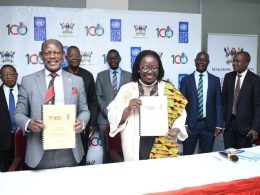By Mark Kawalya
Researchers have developed an Artificial Intelligence-driven solution to convert written Luganda text into speech, aiming to enhance accessibility and communication. The team, from the College of Engineering, Design, Art, and Technology (CEDAT), is led by Principal Investigator Dr. Ronald Kizito from the Electrical and Computer Engineering Department.
The researchers embarked on a study titled ‘A Luganda Neural Text-To-Speech System for Health Promotion and Accessibility’. Funded by the Government of Uganda through the Makerere University Research and Innovation Fund (MAKRIF), the project aimed to facilitate the dissemination of health messages to Luganda speakers who may face barriers in accessing written information. Some of these barriers include factors such as illiteracy or visual impairment.
During a research dissemination seminar at the college, Dr. Kizito underscored the significance of effective communication and the necessity of surmounting obstacles that impede the delivery of messages. He highlighted visual impairment, illiteracy, and physical disabilities as factors hindering Luganda text comprehension, underscoring the significance of the innovation.
The research team, comprising Dr. Andrew Karumba, Dr. Jonathan Serugunda, Dr. Samai Namyalo from Linguistics, and Dr. Deo Kawalya from the Literature Department, collaborated on this multi-year project.
While speaking on behalf of the Dean and the Head of the Department of Electrical and Computer Engineering, Dr. Jane N. Kiyimba, expressed optimism regarding the project’s potential impact on the Luganda-speaking community. She emphasized the enduring relevance of Artificial Intelligence and encouraged its utilization for societal benefit.
Shalina Kawuma, a sociologist from the Ministry of Health’s Department of Health Promotion, Education, and Communication, represented Ag. Commissioner Richard Kabanda at the dissemination event. She invited the researchers to provide a presentation of the research findings to the health information technical working group. She emphasized that the multi-organizational committee would be helpful in providing feedback on the work, ensuring its dissemination, and guaranteeing that the Ministry of Health uses the findings to address areas that aren’t performing as they should.








